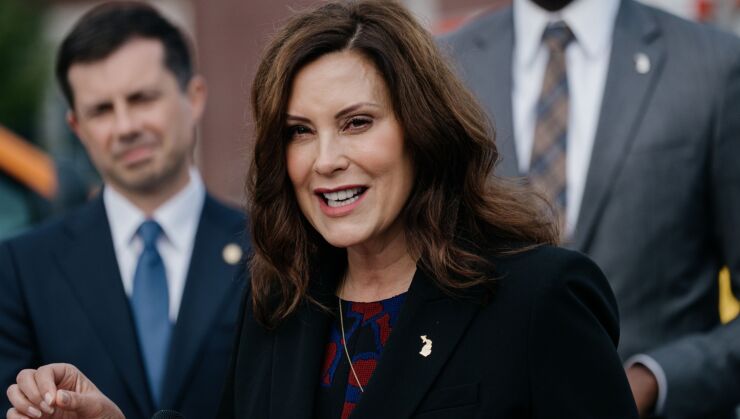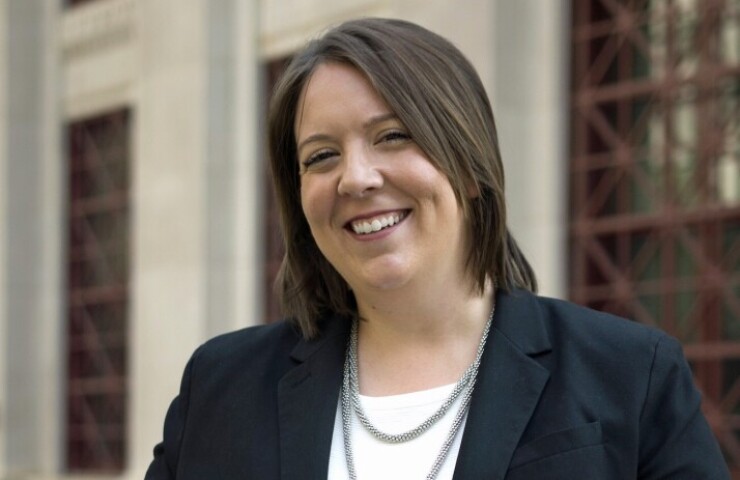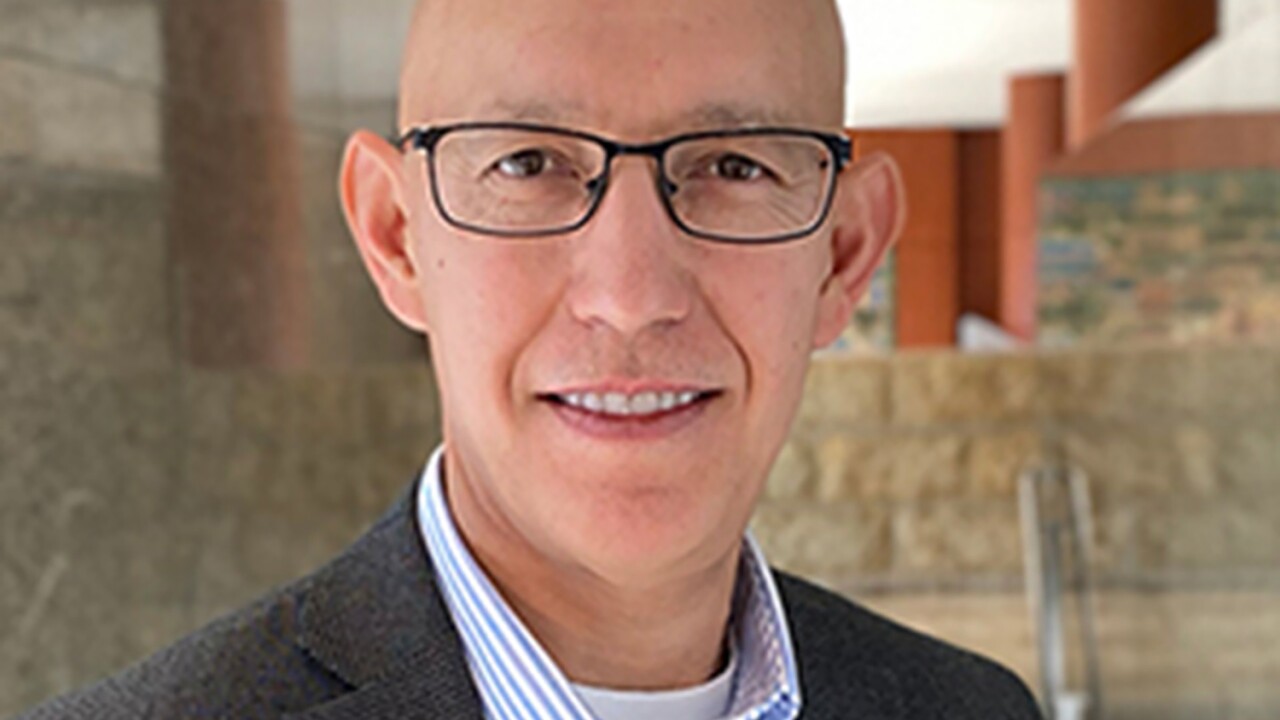Midwest voters had their say this month on a
Minnesota and Michigan re-elected Govs. Tim Walz and Gretchen Whitmer, both Democrats, and empowered their agendas.
In Minnesota, the GOP lost its Senate majority and the Democrat-Farmer-Labor Party held on to its House majority. In Michigan, both houses flipped to Democratic majorities for the first time in four decades.

While both governors had managed to pass budgets — with the path to agreement helped by a flood of COVID-19 pandemic relief and a rising tide of tax revenues —their policy ambitions were hemmed in by Republican lawmakers. Walz has struggled to pass progressive proposals and has had to trim capital packages.
Whitmer's push to raise the gas tax to speed up road work hit a GOP brick wall although she turned to road bonding, with the final $1.9 billion of a $3.5 billion authorization selling next month.
Local governments and education proponents view the shift in the legislatures as improving their prospects for greater state funding as lawmakers in both states have surpluses to spend in the coming year. Minnesota will announce its annual November revenue forecast early next month that will guide future spending plans.
In Minnesota, there will be a push for legalizing recreational cannabis. Bonding bills will still face a tough road because of Democrats' narrow legislative majorities and the three-fifths supermajority needed to approve borrowing.
In Michigan, Whitmer and the current GOP majority agreed to a budget package while putting off more contentious talks over how to spend billions in remaining surplus revenues — with tax relief taking center stage.
Whitmer is pressing for a temporary suspension of the state sales tax on gasoline, issuing a one-time $500 tax rebate, raising the earned income tax credit, and scaling back the tax on retirement income. It's unclear whether there will be an agreement before the new legislature is seated.
Whitmer wants to explore new revenue sources to fund road work but won't resurrect her fuel tax hike.
Changes to Michigan's emergency manager law also could be in play. Democrats would like to pass a review system that provides help to local governments before their situation reaches crisis level and intervention is needed.
The previous law came under fire following Flint's water contamination crisis which occurred while the city was under a state appointed emergency manager. Voters threw out the law but the Republican majority passed a revised one that Democrats say falls short of providing early help.

In Illinois, voters in the Cook County Forest Preserves District, which includes Chicago, gave the green light to a property tax hike that will generate $40 million annually in addition to $100 million currently collected. Proceeds will fund upgrades and stabilize a pension system currently on the road to insolvency.
In addition to pumping money into its pension system,
The district provides the land that houses the zoo and the garden and nearly one-fifth of its annual budget is dedicated to the operation of the zoo and garden.
The district's unfunded pension liabilities increased to $145.4 million in 2020 from $139.9 million and its funded ratio slipped to 59.1% from 59.3%. The fund assumes a 7.25% rate of return and exceeded that at 11.4% for 2020 compared to 18.6% in 2019.
Under the current policy the fund is projected to run out of assets by 2042 if all future assumptions are met and no additional contributions are made.
The
Illinois voters also passed Amendment One, a constitutional amendment that gives more extensive protections to organize and collectively bargain on working conditions, wages, and hours.
Critics of the amendment warn it gives unprecedented powers to labor that could drive up local government costs, and in turn raise taxes, to cover enhanced benefits.
In Jamestown Township, Michigan, voters for a second time voted to defund the Patmos Library due to anger over LGBTQ-themed graphic novels on the young adult shelves.
Members of the public demanded the library remove them, saying some of the depictions were inappropriate and were perceived as grooming children. The library refused.
Voters first defunded the library in the August election but private donations including some from prominent authors kept the library afloat as it awaited a second vote Nov. 8. Voters needed to approve an operating millage request as tax support covers about 85% of the library's budget. The vote Nov. 8 was 55.8% against, according to results posted by the Ottawa County Elections Division.
"Although neither have debt outstanding, the failure by Jamestown Township, Michigan's residents to renew their Patmos Library's dedicated tax millage and the city of Ridgeland, Mississippi's withholding of funds from its library over the presence of LGBTQ+ books present a scenario for trouble to municipal library bond investors," Municipal Market Analytics said in an outlook piece after the first failure.
Library leaders said they expect to cut hours and face closure in 2024 although they expect to try again to approve the millage on a future ballot, according to published reports.
MMA said $1.7 billion of municipal bonds have "library" in the issuer name according to Bloomberg data. While securities vary by state, the threatened withdrawal of a library's funding — whether possible or not — could lead to rating downgrades and impairments for non-general obligation backings.
"This is thus a recommendation for holders of library-related securities to ensure that they understand what they own that they are keeping abreast of local political developments with respect to the above," MMA said. "Smaller, more rural, and more economically concentrated obligors are the most vulnerable to damage from macro or regional trends."
In Missouri, voters signed off on legalizing recreational marijuana use for adults 21 and older, a move that could lend a helping fiscal hand to some local governments.
"Although estimated annual revenue derived from local marijuana sales is marginal at the outset, S&P Global Ratings believes locally derived marijuana revenue could grow over time and provide some municipalities with additional revenue-raising flexibility," analyst Coral Schoonejans said in a special report.
It allows a 6% sales tax on recreational marijuana for the state and gives local governments the ability to apply their own sales tax of as much as 3%, contingent on local electorate approval.
"Depending on if and when local governments request voter approval for recreational marijuana sales tax collections, we believe additional sales tax collections may begin in calendar years 2024 and 2025. Local governments may opt out of recreational marijuana business in their jurisdiction through a ballot measure during a general election in 2024 or beyond," S&P said.
Missouri voters rejected a constitutional amendment that would have allowed the state treasurer to invest state funds in highly rated municipal securities and to authorize the state legislature to pass laws allowing the treasurer to invest in "other reasonable and prudent" financial instruments and securities.
In Kansas City, voters signed off on
The $125 million measure finances improvements to parks, recreation, and entertainment facilities, including $45 million for deferred needs at the Kansas City Convention Center.
The second ballot question authorizes $50 million for affordable housing and blight removal.
In Ohio, Columbus voters approved $1.5 billion of general obligation borrowing in five separate questions to pay for a range of spending from affordable housing and parks to sanitary and storm sewer line improvements.
"This bond package can be subtitled 'building for growth.' We have an incredible relationship with our voters; all requests have passed for over 40 years," said City Auditor Megan Kilgore, who manages borrowing.

In South Dakota, voters endorsed expanding Medicaid, as permitted under the 2010 Affordable Care Act that allows state to leverage additional federal matching funds to help pay for the expanded benefits.
"Expanding coverage comes with increased federal money for healthcare services, as well as added exposure to potential future federal cutbacks and some costs to the state, though we expect these to be manageable," Moody's said in a special commentary.
Approval by South Dakota potentially has more sweeping ramification by providing a "positive for the 39 states and District of Columbia that had already moved to broaden their Medicaid programs" because as more states take advantage of increased federal funding under the ACA, the risk of federal efforts to undermine or repeal it declines, Moody's said.
South Dakota hospitals should benefit from the expansion as it will lower the number of uninsured and bad debt expenses.
In Wisconsin
"Wisconsin voters weighed in on more than 250 referendum questions, approving some types of them in record numbers and shifting the course for their local governments for years to come," the forum said in its review of the results.
School districts had 81 referendums on the ballot with 64 winning approval for a 79% success rate. The measures approved included $1.4 billion of new borrowing in 32 referendums.
La Crosse School District voters rejected its $194.7 million request. Waunakee School District voters passed $175 million of borrowing and Appleton voters approved $129.8 million.
Many big
In Michigan, Troy voters approved $555 million bonds for the school district and Southfield Public Schools voters passed $345 million of bonds.
Downers Grove School District #58 in suburban Chicago approved $179 million of bonds while Bennington Public School District #59, Nebraska, voters rejected $153 million of bonds.





